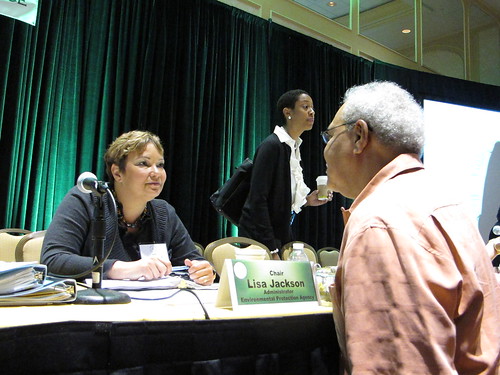As Dolphins Die, Gulf Restoration Task Force Takes Heat
In the Gulf, record numbers of dead baby dolphins are washing onto the shores of Mississippi and Alabama, creating frightening spectacles for families and their kids prowling the beaches. Tourists are bewildered by scientists slicing tissue samples from the lifeless baby mammals.
“It's very distrubing, I didn’t know baby dolphins washed up on the beach like that,” one family member from Minnesota told a Mississippi TV station.
But up in New Orleans an even bigger environmental problem was being discussed inside the Marriott hotel. That’s where EPA Administrator Lisa Jackson was leading a public meeting of the president appointed Gulf Coast Ecosystem Restoration Task Force.
The dozen task force members were stretched out along a long table high above the audience assembled in the large conference room. Their mission? Restore and rebuild the Gulf after the worst maritime oil disaster in history. “This task force was created out of a horrible event, Lisa Jackson told the audience. “We have to look to the future and come together. If we align our resources we will become stronger.”
Not one of the 16 taskforce members up on stage represented NGOs or Gulf community organizations. That didn’t sit right with many who had been promised direct representation by last October.
“I see the same process here that we saw under Bush after the Katrina disaster,” said Louisiana resident Rev. Tyrone Edwards. “It would be much better to have a mixture of environmental and community groups represented than just government officials.”

EPA Administrator Lisa Jackson talks to attendee Photo by Rocky Kistner/NRDC
Others wondered if this was another task force would produce another plan headed for the dustbin. “We are on a sinking ship,” said Gulf Restoration Network’s Aaron Viles. “For 16 years we have not made any headway. We need to make sure this time it’s different. There’s just not a lot of trust in the community now.”
Many who spoke out were not sure their land could be saved, especially in the Louisiana bayou which has the highest loss of wetlands in the country. The land is rapidly being swamped by the Gulf thanks to Mississippi River levies that block marsh-building river water and oil and gas pipelines that slice through the marshes like knives through a cake.
But a major concern for residents is the ongoing health problems many blame on crude and dispersant chemicals. People say they continue to battle unusual respiratory and neurological problems, and they wonder what the long term effects will be.
“The dead dolphin in the room are the health effects,” Louisiana oil disaster activist Elizabeth Cook told the taskforce members.
Patty Whitney of the community group BISCO in southeastern Louisiana pleaded for a complete change in consciousness about the importance of natural resources. “We have to change our value system. As long as the American dollar is the only value, then our ecosystem is going to lose.”
But the dollar was well represented by the Louisiana Seafood Promotion and Marketing Board, which shared a session on food safety with the FDA, the government agency responsible for seafood safety. Both assured the audience that Gulf seafood is safe to eat. An FDA official also stated the agency had adjusted its seafood testing risk assessments to compensate for the greater amount of seafood consumed in the region.
Last year NRDC published a seafood safety survey that showed local Gulf residents were consuming many times the amounts of seafood that FDA used in its seafood risk assessments. NRDC has not been able to determine if the agency has actually changed its assessments, and attendees questioned whether the seafood was safe. Here’s how the Times Picayune described it:
But several speakers said many coastal residents have tested positive for chemicals in their blood like those found in oil from the Deepwater Horizon disaster, such as benzene and xylem, while independent testing of seafood sponsored by environmental groups and attorneys representing plaintiffs in lawsuits against BP and others involved in the spill have found larger amounts of contamination than the FDA tests. They told the task force those results raise questions about pairing FDA scientist's reassurances with seafood promotion board urging that more be done to reassure consumers about seafood safety.
"It's really disturbing to see NOAA and the FDA as a subset of the seafood promotion board," said Anne Rolfes, executive director of the Louisiana Bucket Brigade, an environmental group that assists coastal residents in measuring air pollution.

Discussion with task force member John Harkinson Photo by Rocky Kistner/NRDC
But one of the most compelling comments came from LSU scientist Linda Hooper-Bui, who has been studying impacts of BP oil on insects in the sensitive marshes of Louisiana. Some of her research is expected to be made public soon. “You go out to the marshes and they are silent. We’re in danger of becoming a Silent Spring….this is not just our gulf, but it’s America’s gulf.”
Garrett Graves, a Louisiana coastal restoration official, acknowledged it was an “embarrassment” how little government had done over the past 20 years to stop the destruction of America’s greatest wetland and fishery. But he said this time it was different. “I’ve never seen such participation at such a high level. I’m optimistic the process will yield results.”
The task force is expected to hammer out some kind of draft plan before it meets in May. And officials promise to try to include more community groups in the process.
But there is one key component that wasn’t discussed much at the meeting: money. Gulf restoration projects are going to require a lot of it, but those plans are dead in the water if significant money isn’t included.
Most of those funds will depend on money collected through clean water act violations charged to BP. A battle is brewing on Capitol Hill over how much of those funds actually will be returned to the Gulf for restoration projects. As NRDC’s Regan Nelson has blogged, it’s critical that Congress require the vast majority of BP’s penalties be used to make the gulf healthy and whole again.
